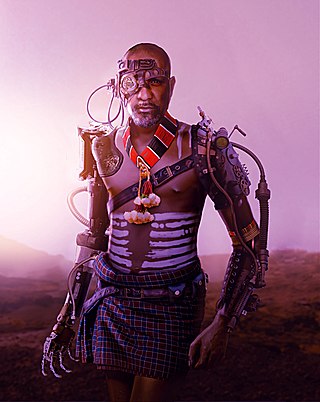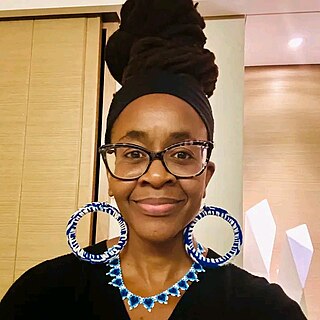
Octavia Estelle Butler was an American science fiction author and a multiple recipient of the Hugo and Nebula awards. In 1995, Butler became the first science-fiction writer to receive a MacArthur Fellowship.

Afrofuturism is a cultural aesthetic, philosophy of science, and history that explores the intersection of the African diaspora culture with science and technology. It addresses themes and concerns of the African diaspora through technoculture and speculative fiction, encompassing a range of media and artists with a shared interest in envisioning black futures that stem from Afro-diasporic experiences. While Afrofuturism is most commonly associated with science fiction, it can also encompass other speculative genres such as fantasy, alternate history and magic realism. The term was coined by American cultural critic Mark Dery in 1993 and explored in the late 1990s through conversations led by Alondra Nelson.

Nigerian literature may be roughly defined as the literary writing by citizens of the nation of Nigeria for Nigerian readers, addressing Nigerian issues. This encompasses writers in a number of languages, including not only English but Igbo, Urhobo, Yoruba, and in the northern part of the county Hausa and Nupe. More broadly, it includes British Nigerians, Nigerian Americans and other members of the African diaspora.

Nnedimma Nkemdili "Nnedi" Okorafor is a Nigerian American writer of science fiction and fantasy for both children and adults. She is best known for her Binti Series and her novels Who Fears Death, Zahrah the Windseeker, Akata Witch, Akata Warrior, Lagoon and Remote Control. She has also written for comics and film.

Mami Wata is a water spirit venerated in West, Central, and Southern Africa and in the Afro-American diaspora. Mami Wata spirits are usually female but are sometimes male.

My Life in the Bush of Ghosts is a novel by Nigerian writer Amos Tutuola, published in 1954. It tells the story of a young West African boy who becomes lost in the wilderness, known as the bush, after fleeing from slave traders with his elder brother. The novel is presented as a collection of related narratives, although not always in chronological order, which adds to its surreal and dreamlike quality.
African literature is literature from Africa, either oral ("orature") or written in African and Afro-Asiatic languages. Examples of pre-colonial African literature can be traced back to at least the fourth century AD. The best-known is the Kebra Negast, or "Book of Kings" from the 14th century AD. Another well-known book is the Garima Gospels, one of the oldest known surviving bibles in the world, written in Ge'ez around 500 AD.

Black science fiction or black speculative fiction is an umbrella term that covers a variety of activities within the science fiction, fantasy, and horror genres where people of the African diaspora take part or are depicted. Some of its defining characteristics include a critique of the social structures leading to black oppression paired with an investment in social change. Black science fiction is "fed by technology but not led by it." This means that black science fiction often explores with human engagement with technology instead of technology as an innate good.
Diversicon is an annual speculative fiction convention held in July or August in the Minneapolis-Saint Paul, Minnesota area. Diversicon provides programming and social opportunities to encourage the multicultural, multimedia exploration and celebration of SF by those within and outside of the traditional SF community. Diversicon includes both live and posthumous guests. It is sponsored by SF Minnesota.
Kachifo Limited is an independent publishing house based in Lagos, Nigeria. It was founded in 2004 by Muhtar Bakare. Its imprints include Farafina Books, Farafina Educational, and Prestige Books. From 2004 to 2009, it published the influential Farafina Magazine.

The Shadow Speaker is a young adult, first-person novel by Nigerian-American writer Nnedi Okorafor, which takes place in the year 2070. It was a Booksense Pick for Winter 2007/2008, a Tiptree Honor Book, a finalist for the Essence Magazine Literary Award, the Andre Norton Award and the Golden Duck Award and an NAACP Image Award nominee. A deluxe revised edition of the novel which was earlier out of print was published by DAW Books in 2023 under the title Shadow Speaker. It was followed by a sequel; Like Thunder.

In mythology and the study of folklore and religion, a trickster is a character in a story who exhibits a great degree of intellect or secret knowledge and uses it to play tricks or otherwise disobey normal rules and defy conventional behavior.
Andrea Hairston is an African-American science fiction and fantasy playwright and novelist. Her novel Redwood and Wildfire won the James Tiptree Jr. Award for 2011. Mindscape, Hairston's first novel, won the Carl Brandon Parallax Award and was short-listed for the Philip K. Dick Award and the James Tiptree Jr. Award. Hairston was one of the Guests of Honor at the science fiction convention Wiscon in May 2012.

Otjize is a mixture of butterfat and ochre pigment used by the Himba people of Namibia to protect themselves from the harsh desert climate. The paste is often perfumed with the aromatic resin of Commiphora multijuga (omuzumba). The Himba apply otjize to their skin and hair, which is long and plaited into intricate designs. Himba women start designing their hair from puberty using the red clay as well as adding on the hair of goats for stylistic purposes. Other documented uses of otjize include initiation ceremonies, the burial of human corpses, and as a mosquito repellent. The use of otjize by both men and women has been documented, with the decline in use by men beginning in the 1960s and attributed to "the presence of the South African Defence Force in the region and the subsequent employment of many men as trackers and soldiers".

Bar Beach is a beach on the Atlantic Ocean along the shoreline of Lagos, situated on Victoria Island. For a time, it was the most popular beach in Nigeria especially when Lagos was the capital of the country.

Kọ́lá Túbọ̀sún is a Nigerian linguist, writer, translator, scholar, and cultural activist. His work and influence span the fields of education, language technology, literature, journalism, and linguistics. He is the recipient of the 2016 Premio Ostana "Special Prize" for Writings in the Mother Tongue for his work in language advocacy. He writes in Yoruba and English, and is currently the Africa editor of the Best Literary Translations anthology, published by Deep Vellum.
Ainehi Edoro is a Nigerian writer, critic and academic. She is the founder and publisher of the African literary blog Brittle Paper. She is currently an assistant professor of Global Black Literatures at the University of Wisconsin-Madison. Her areas of research include 21st-century fiction, literature in digital/social media, The Global Anglophone Novel, African Literature, Contemporary British Fiction, Novel Theory, Political Philosophy, and Digital Humanities.
Africanfuturism is a cultural aesthetic and philosophy of science that centers on the fusion of African culture, history, mythology, point of view, with technology based in Africa and not limiting to the diaspora. It was coined by Nigerian American writer Nnedi Okorafor in 2019 in a blog post as a single word. Nnedi Okorafor defines Africanfuturism as a sub-category of science fiction that is "directly rooted in African culture, history, mythology and point-of-view..and...does not privilege or center the West," is centered with optimistic "visions in the future," and is written by "people of African descent" while rooted in the African continent. As such its center is African, often does extend upon the continent of Africa, and includes the Black diaspora, including fantasy that is set in the future, making a narrative "more science fiction than fantasy" and typically has mystical elements. It is different from Afrofuturism, which focuses mainly on the African diaspora, particularly the United States. Works of Africanfuturism include science fiction, fantasy, alternate history, horror and magic realism.

The Third Generation of Nigeria Writers is an emerging phase of Nigerian literature, in which there is a major shift in both the method of publishing and the themes explored. This set of writers are known for writing post-independence novels and poems. This generation is believed to be influenced by the western world, politics and the preceding generation of Mbari Club writers, Flora Nwapa and Buchi Emecheta. The emergence of the third generation of Nigerian writers has changed the publishing sector with a resurgence of new publishing firms such as Kachifo Limited, Parrésia Publishers, Cassava Republic Press and Farafina Books. These new writers create new genres and methods that deal with racism, class, abuse and violence.












